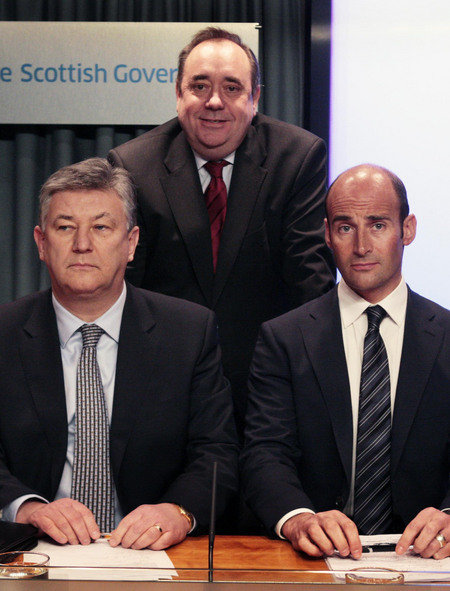All clubs who wish to play in UEFA competition if they qualify on footballing merit have to have a license granted in the period leading up to the season of the competitions. The SFA act on UEFA’s behalf to see that UEFA licensing rules are observed. This year the new UEFA Club Licensing and Financial Fair Play Regulations 2010 apply.
The small tax bill was, perhaps significantly in obfuscation terms, first officially recognised in Rangers delayed accounts for 2010 published on 1st April 2011 as if that put the liability after a key 31st March date under UEFA licensing requirements. In fact the liability was uncovered as part of the new Ranger’s owner Craig Whyte’s due diligence that began long before 31st March, but presentation is all.
However whilst eyebrows were raised the media, as usual, rather than asking awkward questions took part in blowing smoke in people’s eyes. However Celtic supporters, being suspicious awkward characters by nature were not convinced by the presentation.
There was a lull until 10th August 2011 when Sheriff Officers turned up at Ibrox in pursuit of payment of the small (compared to the potential size of the EBT bill but not if you are skint) bill that had been reported on 1st April. This event and the subsequent ring fencing caused the awkward guys to send the letters reproduced at the end of this article, one to the SFA and one to UEFA with a reminder, to ask the awkward question. How did Rangers prove to the SFA (for proof is what is demanded) that the tax bill in question did not fall foul of UEFA rules on unpaid tax bills (or overdue payables to tax authorities as UEFA call it.) and how in light of the fact the bill is still unpaid and the steps HMRC have had to take to get it paid, was a UEFA licence granted?
The SFA replied as follows quoting Article 50 regulations as that was the article referred to in the letter to them. Comments on the reply follow it.
Dear xxxx
Thank you for your letter of 12 August.
I have to point out to begin with that the licensing system has stringent confidentiality requirements which prevent me from commenting on any individual club case,
I can however clarify the various rules.
The UEFA rules are detailed in the UEFA Club Licensing and Financial Fair Play Regulations 2010. The relevant Articles in this case are as follows
Article 50 – No overdue payables towards employees and social/tax
authorities
1 The licence applicant must prove that as at 31 March preceding the licence
season it has no overdue payables (as defined in Annex VIII) towards its
employees or social and tax authorities as a result of contractual and legal
obligations towards its employees that arose prior to the previous 31 December.
2 Payables are those amounts due to employees or social and tax authorities as a
result of contractual or legal obligations towards employees. Amounts payable to
people who, for various reasons, are no longer employed by the applicant fall
within the scope of this criterion and must be settled within the period stipulated
in the contract and/or defined by law, regardless of how such payables are
accounted for in the financial statements.
3 The term “employees” includes the following persons:
a) All professional players according to the applicable FIFA Regulations on the
Status and Transfer of Players; and
b) The administrative, technical, medical and security staff specified in Articles
28 to 33 and 35 to 39.
4 The licence applicant must prepare a schedule showing all employees who were
employed at any time during the year up to the 31 December preceding licence season; i.e. not just those who remain at year end. This schedule must be submitted to the licensor.
5 The following information must be given, as a minimum, in respect of each
employee:
a) Name of the employee;
b) Position/function of the employee;
c) Start date;
d) End date (if applicable);
e) The balance payable as at 31 December, including the due date for each
unpaid element; and
f) Any payable as at 31 March (rolled forward from 31 December), including the
due date for each unpaid element, together with explanatory comment.
6 The employees schedule must be approved by management and this must be
evidenced by way of a brief statement and signature on behalf of the executive
body of the licence applicant.
7 The licence applicant must reconcile the total liability as per the employee
schedule to the figure in the financial statements balance sheet for ‘Accounts
payable towards employees’ (if applicable) or to the underlying accounting
records.
8 The licence applicant must submit to the auditor and/or the licensor the
necessary documentary evidence showing the amount payable (if any), as at 31
December of the year preceding the licence season as well as any payable as at
31 March (rolled forward from 31 December), to the competent social/tax
authorities as a result of contractual and legal obligations towards its employees.
Whilst a liability may exist, it may not be considered as overdue under the Regulations. Annex VIII is quite specific on this point-
Annex VIII Notion of ‘overdue payables’
1. Payables are considered as overdue if they are not paid according to the agreed
terms.
2. Payables are not considered as overdue, within the meaning of these
regulations, if the licence applicant/licensee (i.e. debtor club) is able to prove by
31 March (in respect of Articles 49 and 50) and by 30 June and 30 September
(in respect of Articles 65 and 66) respectively that:
a) it has paid the relevant amount in full; or
b) it has concluded an agreement which has been accepted in writing by the
creditor to extend the deadline for payment beyond the applicable deadline
(note: the fact that a creditor may not have requested payment of an amount
does not constitute an extension of the deadline); or
c) it has brought a legal claim which has been deemed admissible by the
competent authority under national law or has opened proceedings with the
national or international football authorities or relevant arbitration tribunal
contesting liability in relation to the overdue payables; however, if the
decision-making bodies (licensor and/or Club Financial Control Panel)
consider that such claim has been brought or such proceedings have been
opened for the sole purpose of avoiding the applicable deadlines set out in
these regulations (i.e. in order to buy time), the relevant amount will still be
considered as an overdue payable; or
d) it has contested a claim which has been brought or proceedings which have
been opened against it by a creditor in respect of overdue payables and is
able to demonstrate to the reasonable satisfaction of the relevant decision making bodies (licensor and/or Club Financial Control Panel) that the claim
which has been brought or the proceedings which have been opened are
manifestly unfounded.
Whilst I cannot be any more specific regarding any individual case, I can point out that our licensing system does undergo rigorous quality control checks. The system is ISO9001 registered and was recently audited by UEFA directly. Whilst the UEFA audit referred to decisions for last season. I can highlight that no material variances have been identified in the processes or the decisions that have been taken for clubs.
Thank you for taking the time to write to me.
Yours Sincerely
STEWART M REGAN
CHIEF EXECUTIVE.
Now perhaps the fact that only Article 50 was referred to in the letter to the SFA is why the SFA response confined itself to responding on that basis, but the SFA must have known about Article 66, indeed it is mentioned in their reply, and it contains dates that might have been more awkward to explain against.
UEFA however have been asked similar questions under Article 66 but more on that later. The avoidance of Article 66 does however cast some doubts on the final assurances in the letter that the SFA are as rigorous in their quality control of answering the thrust of the question.
That apart what the SFA say is that although the liability existed at 31st March it was not in fact an overdue payable under the UEFA rules, so let’s look at that in light of what is now known. Remember Rangers had to prove to the SFA sometime between 31st March and 30th June that the bill was not an overdue payable. How did they pass a proof test?
- It is reasonable to assume that had the bill been paid under the agreed terms when it was first issued HMRC would have done nothing further but collect, so the agreed terms could not have been met so why it was not deemed overdue?
2. (a) The bill had clearly not been paid by 30 June and looks to be unpaid at time of writing by 30th September. Fail – Not Proven
2. (b) No agreement to extend the time to pay appears to have been concluded or if it had Rangers have either failed to keep to that agreement or misled the SFA– Fail – Not Proven
2. (c) Rangers appear not to be contesting liability in respect of the overdue payable core amount, only the penalty and appear not to have brought a legal claim deemed admissible under national law, or have opened liability contesting proceedings, had they done so there would have been no Sheriff Officers What were the SFA told? Fail – Not Proven.
2. (d) Rangers have not contested the main element of the claim that has been opened against them and on the evidence of events i.e. the ring fencing of the sum due by HMRC the claim is NOT manifestly unfounded. Fail – Not Proven
The original question asked is just how do Rangers get away with it? Somewhere in the process outlined above the answer lies.
Oh and UEFA? Still to hear from them.
See below…
UEFA
Route de Genève 46
Case postale
CH-1260 Nyon 2
Switzerland
Date: 7 September 2011
Dear Sir
I wrote to you on 23 August about a licensing issue and had my letter delivered by recorded mail. I trust you have received it. This letter is by way of a reminder that I have had no reply or acknowledgement, to bring a further piece of information to your attention and add a comment.
The following was taken from an article in the Glasgow Evening Times of 5th/6th Sept.
( http://www.eveningtimes.co.uk/news/editor-s-picks/rangers-sued-by-law-firm-over-unpaid-bill-1.1122032 )
The latest financial woes to hit the Scottish champions emerged as former owner Sir David Murray made clear that Craig Whyte, the businessman to whom he sold Rangers, was “fully aware” of an outstanding tax liability of £2.8million before buying the club.
And
A spokesman for the Murray Group said: “Craig Whyte and his advisers were fully aware of the £2.8m tax liability before buying the club. The liability was included in our accounts for the six months ending on December 31, 2010.
The accounts referred to will have been Murray International Hoidings, Rangers parent company before the takeover. It is clear from this that the unpaid tax did not materialise out of thin air after the !st of April.
I await a response to my original letter which is repeated below but with one further comment.
This is not about exposing Glasgow Rangers or the SFA. It is about restoring the integrity of the game in Scotland before it dies (if it is not too late already). In that respect UEFA might wish to look at the part the distribution of UEFA money to title winners in Scotland has played in bringing our game to its sorry state and perhaps step in to help it out of its mess.
Yours sincerely
xxxx
——————————–
Dear Sir (Copy of letter of 23 August 2011)
I have a question about the club licensing process set out in UEFA Club Licensing and Financial Fair Play regulations 2010 and some supplementary questions depending on the answer to the main question.
Q1. I appreciate that the new “break even” regulations are being phased in over coming seasons but can you confirm that the regulations under Article 50 in respect of “No overdue payables towards employees and social/tax authorities” and Article 66 in respect of “No overdue payables towards employees and/or social/tax authorities – Enhanced” apply for the licensing period for this season’s UEFA competitions 2011/12 and should have been used by national licensing authorities when deciding if a license should be granted?
If yes, then having looked at the detailed and clear mandatory instructions in those regulations how was it possible for Glasgow Rangers F.C. of Scotland to be granted a UEFA licence when they had in their possession an HMRC assessment for payment that became an overdue payable on 31st March 2011 and for which no agreement for payment could have been in place as indicated by sheriff officers turning up at Rangers stadium in furtherance of payment on 10th August 2011? See
http://news.bbc.co.uk/sport1/hi/football/14482034.stm
Specifically how did Rangers prove to the licensor by the 30th June when they had made provision in their interim accounts (signed off later than normal on 1st April) that they had no payables overdue in respect of tax? Your rules state:
Article 66 – No overdue payables towards employees and/or social/tax
authorities – Enhanced
1 The licensee must prove that as at 30 June of the year in which the UEFA club
competitions commence it has no overdue payables (as specified in Annex VIII)
towards its employees and/or social/tax authorities (as defined in paragraphs 2
and 3 of Article 50) that arose prior to 30 June.
Rangers clearly accepted before 30th June that the tax was due, although they are disputing the penalty, and at the time of writing (23rd August) it is not clear if any payment has been made or any accommodation with HMRC has been reached. On the face of what is in the public arena a licence should not have been granted if the rules were followed.
I would be grateful therefore if you could answer my main question about the effective date that the regulations in Articles 50 and 66 apply from and confirm that no reason exists that prevents their application.
I appreciate that “confidentiality” might be given as a reason not to respond to the supplementary question, but I am not asking for any detail on Ranger’s accounts or business. What I am seeking is clarification that the UEFA regulations have been properly applied and that UEFA themselves are satisfied this has been the case in this instance of an apparent overdue payable to a tax authority.
It is important to be clear on the licensing rules as the matter might have to be revisited in respect of the outcome of the Employee Benefits Trust tax case concerning a much larger tax bill that is likely to have “going concern” implications for Rangers under Article 52 of the regulations for season 2012/2013 if HMRC are successful this year in pursuit of this different but considerably larger claim.
The integrity of football in Scotland as well as a signal of UEFA’s resolve to install good governance principles in European football as a whole requires as full an answer to my questions as is possible. My thanks in advance.
Yours sincerely
xxxx
——————–
It’s now the final week in October and UEFA have yet to respond…
Have we been denied a place in the Champions League for 2011-2012 due to incompetence or worse on the part of the SFA? We think we should be told…





